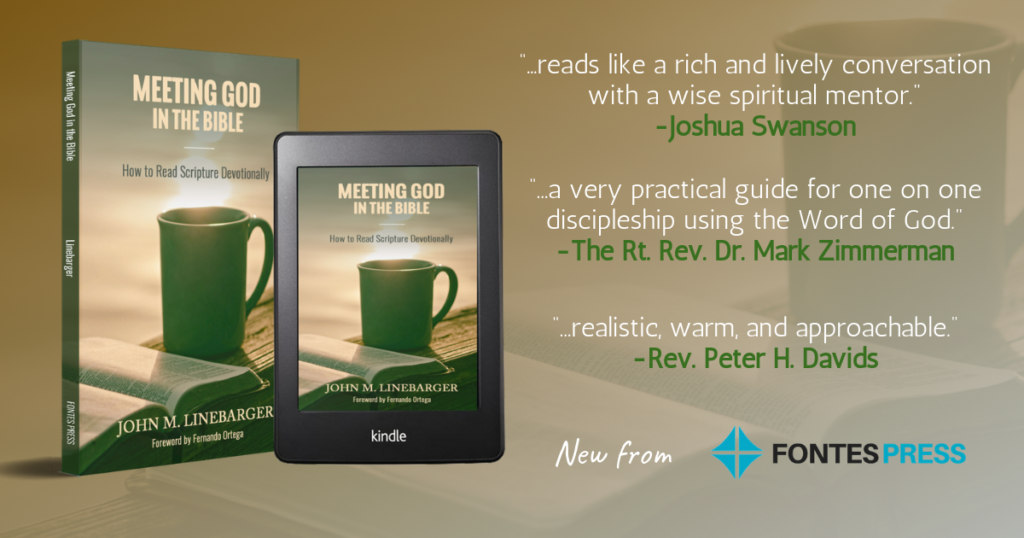
It’s the same way with all relationships. The need for a relationship with God can be felt most acutely during times of sustained absence or during times of crisis. We flip through the pages of the Bible desperately pleading that God will speak to us, hoping against hope that words intended just for us will jump off the pages and take root in our souls. But unless we have cultivated the habit of meeting God in the Bible during times of calm, all too often we find it difficult to meet God in the Bible during times of conflict.
I’ve lived that pattern for much of my life. I was blessed to be raised in a Christian home, and have been a child of the Church for as long as I can remember. I excelled at Scripture memorization; I led high-school youth groups; I was a counselor at Christian camps; I did my undergraduate degree at a Christian college. Yet in hindsight, my knowledge of the Bible was far greater than my experience of the God of the Bible. The Christian life had become a head game like all of my other academic pursuits.
Yet the Hound of Heaven pursued me, bounded me, protected me, held me in his loving embrace despite my tendency to keep him at arm’s length. And in the fullness of time the long arms of God drew me close when I was finally open to intimacy, during a time of physical crisis that morphed into a spiritual crisis. In the economy of God, he used that time economically to give me a call to preach and also to start a relationship with the woman who is now my wife. Though I already had a seminary degree at that point, I had to relearn from first principles how to meet God in the Bible and cultivate the habit of hearing his voice in Scripture. The Quiet Times that I had taught to campers in my cabins during the summer finally became real to me; I learned the practice of spiritual journaling that I had once discounted as something that would never appeal to me; and I embraced the unfamiliar (to many Protestants, at least) practice of Lectio Divina, which bakes an encounter with God into its very warp and woof.
When I contemplated how I might pass such lessons on to others, I was drawn to the vehicle of story because a good story is seductive and even subversive; a spoonful of sugar that helps the medicine of information go down. The goal is to learn by modeling instead of by proposition. Knowledge acquisition, and ultimately behavior modification, is accomplished by modeling through story. Early in my career as a computer scientist I had read The Goal by Eli Goldratt, which taught principles of supply chain management as a side effect of a novel-length story. Other books of that kind would pop up now and then in the business world, from the story-based books by the Arbinger Institute (such as Leadership and Self-Deception), to the tale of a software development team in The Phoenix Project, to the series of “Leadership Fables” by Patrick Lencioni (perhaps most memorably The Five Disfunctions of a Team). But to my knowledge, no books which adopted that approach had appeared in the domains of spiritual formation or devotional Bible study.

I thought that the story of a long-term discipleship relationship might form an effective narrative backbone, and that I might have a bimodal audience for such a book–new Christians and more experienced Christians who had lost (or never really learned) the habit of meeting God in the Bible. Sharon is a pastor’s wife with three children who falls into the “experienced Christian” category, and she is mentoring a new believer, a single woman in her 20s named Victoria. Like me, Sharon grew up in a Christian family. But the pressures and conflicts of ministry had led her to a dry patch in which she did not meet God in the Bible at all. Decision by decision, schedule commitment by schedule commitment, she had to relearn how to make devotions with God a priority. Victoria is full of personality, impatient, given to nervous tics, and wracked with guilt about her relationship with her mother. She was a bit of a party girl before God turned her life around, and is learning how to meet God in the Bible for the first time. Extinguishing the habits of sin that characterized her previous lifestyle remains a challenge.
I originally architected the book in three parts, one part for each of the devotional methods of Bible study that I planned to cover (Quiet Time, Spiritual Journaling using the SOAP Method, and Lectio Divina). But as I began writing, it became clear to me that such devotional methods do not exist for their own sake. Instead, they are fundamental components of the lifelong spiritual formation process. So I included other spiritual formation practices in the book as well, such as Scripture memorization, a theology and praxis of prayer, overcoming temptation, biblical interpretation principles, and how to discern God’s voice.
During the writing of the book I was privileged to have the support of two church homes. One church, Church of Our Lord in the South Valley of Albuquerque, New Mexico, supported me with prayer and encouragement, especially during a long period of writer’s block when I despaired of ever finishing. Another church, Hope Church in the Northeast Heights of Albuquerque, allowed me to teach a Sunday School class based on a draft version of the book. Their challenging questions and perceptive suggestions greatly improved the book. Fernando Ortega, the Dove-Award-winning Christian recording artist, contributed a beautiful and vulnerable Foreword, which is also included in the Web site that supports the book (located at http://fontespress.com/meetinggod). Several friends and colleagues also wrote graciously positive reviews of the book.
Let me end with a version of the teaser that I originally wrote for the Sunday School class, and which appears on the back cover of the book. I’m hoping that it will serve as both description and enticement:
Are you a new Christian who wants to learn how to read the Bible and hear God’s voice? Or are you a more experienced Christian who struggles with meeting God in the pages of Scripture because your head is more engaged than your heart or your hands? Do you long for true intimacy with God, for the sense that God is speaking directly to you through his Word? If so, then this book might be for you. And you’re in good company.
Meeting God in the Bible through the devotional practices of Quiet Time, Spiritual Journaling, and Lectio Divina is explored almost entirely through story—an extended story of a long-term discipleship process between a pastor’s wife and a new Christian. Other Spiritual Formation practices encountered in the story include prayer, spiritual testimony, overcoming temptation, Scripture memorization, discipleship, and biblical interpretation. God has made us for himself, and we invite you to deepen your journey toward the intimate communion with God that you were created for.”
Linebarger’s Meeting God in the Bible is available in Paperback and Kindle

